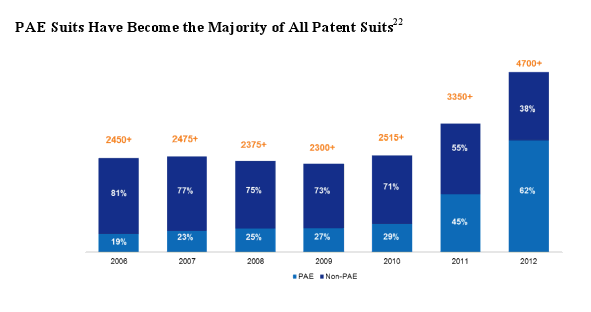Google, along with BlackBerry, EarthLink and Red Hat, today appealed to the Federal Trade Commission and Department of Justice to take stronger action against companies like Lodsys, Intellectual Ventures, and other “patent assertion entities” (aka patent trolls or so-called patent privateers) — companies they believe abuse patents for financial gain and are an increasing detriment to the technology industry, costing U.S. companies alone nearly $30 billion in 2011, “and $80 billion when accounting for all costs – direct and indirect.”
The news comes as some believe Congress may be gearing up to get involved in some anti-troll legislation themselves, with one option being requiring trolls who lose cases in court to pay court costs for both sides.
The four companies’ position was laid out in a lengthy comments document submitted to both the FTC and DoJ. The 22-page report describes how PAEs’ activities have evolved over the last several years; they claim that their licensing regimes and court cases cost the U.S. economy some $30 billion annually.
“Trolls are hurting consumers and are increasingly going after small businesses, hampering innovation and reducing competition,” Matthew Bye, Google’s Senior Competition Counsel, notes in a blog post.
One graphic in particular highlights the state of play and just how much patent-chasing companies have encroached into the market.
Although trolls spend a lot of time issuing letters demanding licensing payments before conflicts ever reach the courts, there is also an increasing amount of litigation, with PAE cases now accounting for 62% of all patent lawsuits:

Google also notes that PAEs are filing four times as many cases today as in 2005, and that targets run the gamut of large corporations like Google and BlackBerry to small and medium-sized businesses. Lodsys, for example, has gone after independent app developers in a very high profile way more than once, demanding licensing fees for apps that feature transactional elements — leaving the door wide open to catch and any all companies they feel fall foul of their IP.
But although companies like Lodsys and Intellectual Ventures may be some of the more recognizable names in the area of patent assertion entities, there are a growing number of other companies that Google & Co. feel fall into the same category. These include the UK telco BT, which is suing and being sued by Google over a number of patents in both the UK and U.S. BT was referred to as a “patent privateer” at the time that the suits were getting filed in February 2013.
In some cases, patents appear to be getting used as a resource of last resort for companies with bigger, more dire financial problems. Ericsson, the troubled telecoms equipment company, has transferred some 2,000 of its patents to Unwired Planet, which is involved in patent litigation against Apple, Google and BlackBerry. Ericsson stands to gain financially if its patents prove to be useful in any legal cases.
“Our comments today also focus on a worrisome trend: some companies are increasingly transferring patents to trolls—and providing incentives to assert those patents against their competitors. These transfers can raise rivals’ costs and undermine patent peace,” Bye writes.
Companies like Twitter and Google have come out publicly with statements about how they intend to approach patents in the future in a non-aggressive way, giving more power to inventors and less to the companies themselves.
The idea is that this will encourage clever people to keep creating new things, while at the same time affording them some protection that those things will not get copied by others; and also that big companies won’t come along and try to use IP as a lever to stifle other people’s innovations. Google is trying to get more companies to sign up to this way of thinking — a kind of arms treaty to counterbalance the arms race underway with patents. But like actual arms races, it’s messy business. At the same time that Google criticises patent aggression, it remains also a key player.
Whether companies like Apple, Samsung (which happens to be the world’s patent leader in mobile technology at the moment) and the rest will listen is another story. As for PAEs and whether they will get regulated to rein in some of their activities, the ball’s now in the government’s court.
